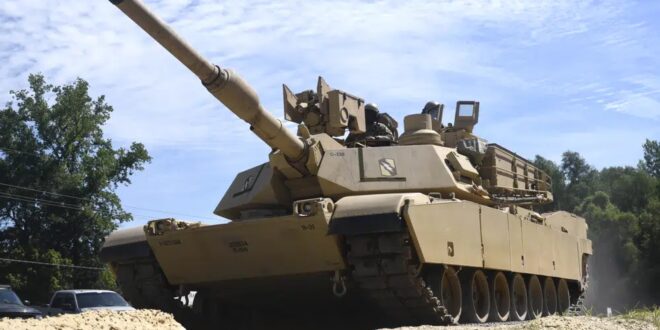The U.S. Abrams tanks needed for training Ukrainian forces have arrived in Germany slightly ahead of schedule and are on their way to the Grafenwoehr Army base where the training will begin in two to three weeks, U.S. officials said Thursday.
Defense Secretary Lloyd Austin told the Senate Appropriations defense subcommittee that the U.S. had moved “a number of tanks over into theater” so the Ukrainians could begin training on them. By the time they complete the training, expected to last about 10 weeks, the Abrams tanks currently being built for the Ukrainian forces will be ready, he said.
A U.S. official said the 31 M1A1 Abrams tanks needed for the training arrived at the port in Bremerhaven, Germany, last weekend and they will get to the base by early this coming week. Their arrival at Grafenwoehr is a couple of weeks ahead of the schedule that was mapped out when military leaders from around Europe and elsewhere met in Germany last month to discuss Ukraine’s needs for the war against Russia.
The tanks the U.S. is providing Ukraine are being built to its military’s specifications and will get to Ukraine by early fall, just as the troops are finished with their instruction. The official spoke on condition of anonymity to provide details of the delivery not publicly released.
The tank training will be the latest and most lethal new layer of combat instruction the U.S. is providing Ukraine’s troops to give them the best chance to overwhelm and punch through Russia’s battle lines. Over the past few months U.S. troops have trained more than 8,800 Ukrainians, including on how to use Stryker and Bradley fighting vehicles and M109 Paladins together on the battlefield. The Bradleys and Strykers are armored and armed vehicles used to ferry troops, and the Paladin is a self-propelled howitzer gun.
During Thursday’s hearing, Sen. Susan Collins, R-Maine, pressed Austin to move quickly to get the tanks into Ukrainian troops’ hands and onto the battlefield.
“We are doing everything possible to accelerate the delivery of these tanks, and early fall is a projection,” Austin said.
Collins and others noted the urgency of the fight in Ukraine, and she told Austin and Army Gen. Mark Milley, chairman of the Joint Chiefs of Staff, to be blunt about Ukraine’s needs. Defense leaders should not let budget concerns dissuade them from seeking more weapons if that’s what Kyiv needs to be successful in a counteroffensive, said Collins, the ranking Republican on the panel.
“It is critical that the administration provide Ukraine with what it needs in time to defend and take back its sovereign territory,” she said. “We expect the administration not to wait until the 11th hour if the Ukrainians seek more before the end of the fiscal year.”
Sen. Lindsay Graham, R-S.C., noting the broader implications of the war, questioned Milley on the impact a Russian victory could have on China and its deliberations on whether to move to take the self-governing island of Taiwan, which Beijing claims.
“I think that the Chinese are watching the war between Russia and Ukraine very carefully,” Milley said, adding that if Russian President Vladimir Putin succeeds, “China will learn certain lessons.”
“It may not be the single decisive point, but I think it will calculate into their decision-making process as to whether or not they attack to seize the island of Taiwan. So I think the outcome of Ukraine is critical to much broader issues than just Ukraine,” Milley said.
 Eurasia Press & News
Eurasia Press & News



